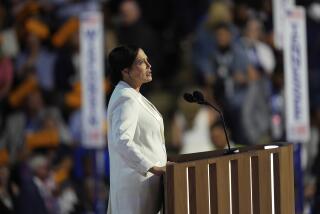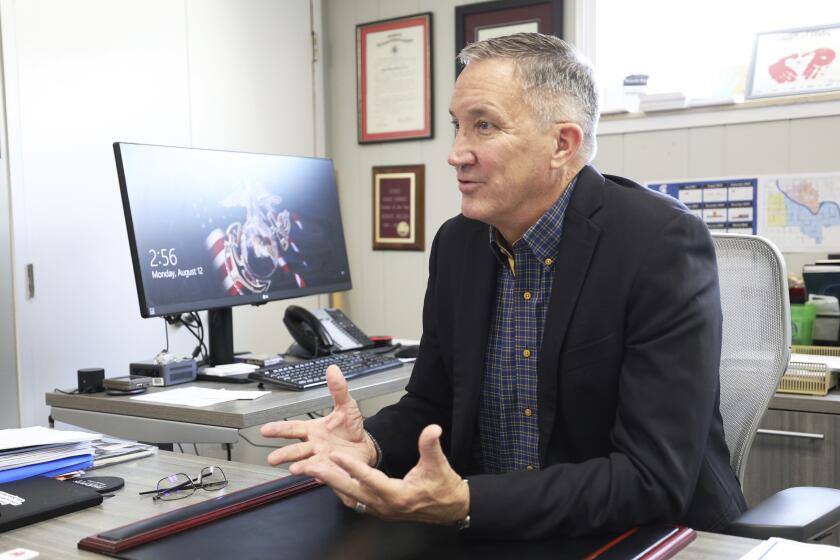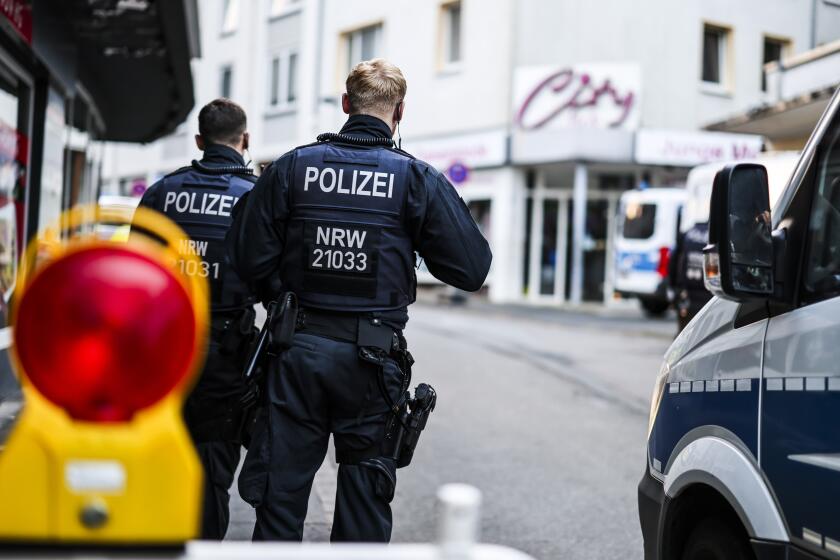U.S. Starts Dismantling Haiti Army, Orders End to Beatings : Caribbean: American commanders move to abolish feared armored unit. More than 1,000 MPs will help enforce peace after brutal attacks on civilians.
American commanders Wednesday began dismantling the Haitian army, ordering the abolition of its most powerful unit and telling Haiti’s military leader that “the beatings of civilians must stop now.”
After a morning meeting between Lt. Gen. Hugh Shelton, commander of the American occupation force here, and Haitian army chief Lt. Gen. Raoul Cedras, a U.S. Army spokesman made this announcement:
“In an agreement signed by Gen. Shelton and Gen. Cedras, the Heavy Weapons Company . . . will cease to be a viable military unit. . . . All weapons of the unit (60 antiaircraft guns, six armored personnel carriers and assorted other armament) will be rendered inoperative.”
The Heavy Weapons Company, with about 200 soldiers, is considered the only relatively well trained and equipped unit of the 7,000-member Haitian army. It had a fearsome, almost mystical reputation for the rest of the troops and the population at large.
“I can sleep now,” a Haitian driver said. “They won’t be able to come into my home with their Uzis and rob us.”
In other developments Wednesday:
* More than 1,000 U.S. military police were put on alert in Haiti to guard against further violence by Haitian forces.
* Haiti’s de facto civilian government banned public demonstrations.
* Cedras said he will not go into exile, although he is required to step down by Oct. 15.
* U.S. troops continued to pour into Haiti, with up to 8,000 expected to have arrived Wednesday, part of a force of about 15,000 scheduled to arrive by the end of the week.
* In Washington, the Senate approved by a 94-5 vote a resolution commending the pact negotiated by a team led by former President Jimmy Carter that averted a U.S. invasion by force but calling for the “prompt and orderly” withdrawal of U.S. troops as soon as possible.
U.S. planners had marked the Heavy Weapons Company--considered one of the most brutal army groups--as one of its three initial assault targets, equal to the seaport and airport.
The unit was used almost entirely for political intimidation and to stage military coups, including the one that drove President Jean-Bertrand Aristide from office on Sept. 30, 1991.
Its elimination “removes the guts of the army,” one military expert said, “and certainly means the end of the Haitian army as it has been constituted.”
One Haitian political expert, a supporter of Aristide’s scheduled return to Haiti from his U.S. exile, literally danced with joy when told of the end to the feared Heavy Weapons Company.
“It was the heart of every coup in the past eight years. It means that the Americans are really well advised, because Heavy Weapons is the symbol to every Haitian of the evil of the army,” he said.
An officer said Wednesday’s action will also ease “the frustrations and the anger” of U.S. troops, who mostly looked from behind fences and walls Tuesday as Haitian police and army troops beat groups of civilians--including youngsters--with clubs, whips and other weapons.
“Certainly it hurt morale,” said the officer, a captain from the 10th Mountain Division and a native of Pueblo, Colo. “We’re told we’re here to support democracy and stop the bloody government here, and then we’re told not to step in when children are being clubbed.
“This business with more patrols and what you tell me (about the end of the Heavy Weapons unit) means we mean business. Good.”
Col. Barry Willey, the U.S. military spokesman here, told reporters that the Heavy Weapons barracks in the Port-au-Prince suburb of Frere “will be occupied jointly by U.S. Special Forces troops and some Haitian soldiers.”
Other officers said the Americans will be in charge, and that calling the occupation a “joint” effort was a sop to Cedras and an effort to head off any potentially violent reaction by the Haitian soldiers.
The American takeover began Wednesday afternoon and was followed by the removal of the weapons by U.S. forces to a nearby area where the arms would be put on display for the public.
The tough action accompanied even stronger declarations by Shelton and his deputy, Army Maj. Gen. David C. Meade, that the brutal behavior of Haitian police and soldiers toward peaceful pro-U.S. demonstrators Tuesday “was totally unacceptable” and might require more direct U.S. action.
The warnings were backed up by the arrests of some Haitian soldiers and a larger, more mobile American military presence on the streets of Port-au-Prince, particularly in the areas where the Haitian troops beat at least one civilian to death Tuesday and generally terrorized the thousands of people who had assembled to watch and cheer the arrival of U.S. forces.
Military on Alert
More than 1,000 Army military police began arriving in Haiti on Wednesday, and officials said a rapid-deployment unit will be available to enforce order on the streets.
But even before those units landed, U.S. military patrols were increasingly evident near the wharf and airport, the sites of most of Tuesday’s brutality.
Vehicles and trucks carrying machine guns and heavily armed soldiers moved along the roads near those areas, and at least one convoy of Humvees, the Army’s replacement for Jeeps, drove past the port’s main entrance.
Haitian soldiers were also seen enclosed behind barbed wire and sandbags and guarded by U.S. troops.
The aggressive stance seemed to work.
Initially sparse crowds along the waterfront and at the airport expanded over the course of the day into tens of thousands. But unlike the situation Tuesday, there were few police or Haitian soldiers in sight.
There were reports that a policeman beat a child in front of the U.S. Embassy on Wednesday afternoon, as well as other isolated incidents, but nothing as serious as Tuesday’s street attacks.
Shelton and Meade met with Cedras on Tuesday night after the incidents, which were widely witnessed and reported by international media, and again Wednesday morning.
Telling reporters that the beatings, which occurred in front of facilities being occupied by Americans, were carried out with “unnecessary force,” Shelton said Cedras was told in the second session that “the beatings of civilians must stop now.”
This was an intensification of Shelton’s earlier charge to Cedras, who led the coup that drove out Aristide, the country’s first democratically elected president.
On Wednesday morning, Shelton had sought to downplay Tuesday’s violence in an interview with CBS News’ Harry Smith. “I’m afraid that what has happened in the last 24 hours . . . has been an over-concentration, if you will, on a couple of isolated incidents,” Shelton said, “whereas throughout the rest of the city and . . . in the countryside, the Haitian people themselves are dancing in the street. . . . They are in a more stable and secure environment than they have been in the past.”
In another CBS interview Wednesday night, Cedras said he will not go into exile, since the accord negotiated Sunday with Carter only stipulates that Cedras must retire from the army by Oct. 15 and says nothing about him leaving Haiti.
President Clinton has indicated in the past that Haiti’s top military leaders should leave the country.
Some U.S. officers in Haiti pointed to the abolition of the Heavy Weapons Company as a sign that whether Cedras agrees or not, the Americans “will do it on our own.”
Meade, who also is commander of the Army 10th Mountain Division, the main troop component now in Haiti, said that Tuesday’s action by the Haitian forces “was totally unacceptable,” and that that is what Cedras had been told.
The U.S. generals also told Cedras to stop “the constant and inflammatory broadcasts on national radio and television.”
Television has been showing almost perpetual reruns of an anti-American documentary about the 1989 invasion of Panama.
In addition, Cedras was told by Shelton “that Haitian officials must take a more active role in taking arms away from unauthorized people.”
This would be particularly significant in crippling the power of the civilian auxiliaries--groups armed by the military and used to carry out the terror and killings that have plagued Haiti in the three years since the coup.
Protests Banned
While the U.S. military was cutting into the strength and authority of the Haitian army, the de facto civilian government made an effort to exert some independence, banning all public demonstrations. In spite of the ban, Haitians turned out in large numbers in the streets Wednesday.
U.S. Embassy spokesman Stanley Schrager responded, saying: “We cannot support such a ban that prohibits demonstrations,” which he described as essential expressions of the democratic system that the United States wants established here.
“At the same time,” Schrager said, “we hope there will not be provocative demonstrations, such as rock-throwing.”
More on Haiti
* THE SENATE VOTES--Afraid the U.S. military occupation of Haiti may already be going awry, the Senate passed a non-binding resolution, 94 to 5, which declared its support for the forces sent to Haiti without endorsing Clinton Administration policy. A4
* BACK TO HOMELAND--For a number of handpicked Haitian Americans in the U.S. military, the mission is more than a chance to return to their native land. Their presence is part of the Pentagon’s increasing effort to focus on the political aspects of the crisis. A5
* OTHER STORIES, PHOTOS: A4-7
More to Read
Sign up for Essential California
The most important California stories and recommendations in your inbox every morning.
You may occasionally receive promotional content from the Los Angeles Times.






